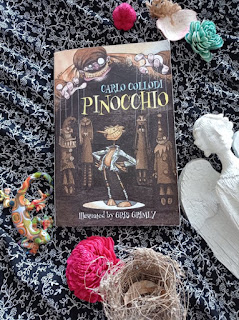A classic tale of mischance and mischief.
A naughty wooden puppet gets into trouble, disobeys his father, forgets his pomises, and skips through life looking for fun. Just like a "real boy." Until he learns that to become truly real, he must open his heart and think of others.
MY THOUGHTS:
I'm on a roll with my reading of old kids' classics. Carlo Collodi's original tale of Pinocchio is said to be 'picaresque.' I admit I had to look that one up, and discovered it refers to an episodic style of fiction which deals with the adventures of a rough and dishonest, yet appealing hero. Ah well, our wooden boy always seeks immediate gratification, even though that's not how the world works. He's both naive and stubborn. He's easily led astray by other unscrupulous rascals. And he can be very thoughtless, such as when he sells a hard-earned spelling book purchased by his father to pay his fare into a travelling show. He fits the bill of anti-hero indeed.
Pinocchio turns out to be both the unluckiest and luckiest puppet to be found anywhere. He's unlucky because some of his adventures are truly the stuff nightmares are made of! Believe me! Yet he's lucky because somehow, he keeps managing to slip out of these horrendous predicaments.
I picked this old kids' classic off the shelf not knowing whether I'd enjoy it or not. Sadly, unlike other gems such as Charlotte's Web, I give it the thumbs down overall.
Firstly, this original story is not the sanitised version Walt Disney made of it, but far more dark, unsavoury and disturbing. Instead of an essentially innocent little puppet with cute, finely-chiselled features, the original Pinocchio is more crudely formed and sometimes violently reactive. For example, there is a talking cricket, but his name is not Jiminy. He's just a well-meaning insect who starts giving Pinocchio some advice and gets squished against the wall with a hammer for his pains! Yes, Pinocchio tends to be that sort of act-now-and-think-later guy. But what I object to even more is the hidden agenda permeating the plot.
It's hard to see much charm in a load of Industrial Revolution/Protestant work ethic propaganda written to keep kids toeing the line. Over and again the same theme is hammered into us readers; the value of hard work. It's either shown scarily through graphic incidents in the story or stated outright through the voices of moralistic mentor characters. Then just in case we still haven't got it, it's shown and told to us yet again. Sober and responsible wins the day while lazy and disobedient lands you in all sorts of hot water.
Modern messages such as figuring out how to work smarter rather than harder were way in the future. It seems to be written especially to keep the masses of blue collar workers in their place. And cutting through all the quirkiness is a grim and unforgiving tone. Although making mistakes is an inevitable part of growing up, you wouldn't believe it to read this book. Poor Pinocchio has long stretches of working very hard and earnestly, yet every momentary lapse into seeking fun or shirking his dour duty is severely paid out.
Circumstances force him to wear the consequences of his weaknesses and transgressions for all to see and shame. He tells a few lies and his nose grows longer. He joins some friends at a funloving commune, and first their ears become pointed donkey ears, and then they turn into donkeys outright! The awful karma stuff gets a bit much. At one point Pinocchio reflects, 'Ever since I've been in the world, I've never had a happy quarter of an hour.' I found that very poignant, because it seems to me his dogmatising author wished to keep it that way.
Even Pinocchio's happy ending is all to do with conforming to be just like everybody else. From the very start, he hates the limitations of being a puppet and dreams of becoming a real, flesh and blood boy like those he attends school with. We're meant to rejoice with him when his fondest dream finally becomes a reality, and he presumably gets to join the line of poor plebs like his father Geppetto, either starving in silence or working their fingers to the bone for a crust. If I'd been a friend of Pinocchio's, I would have kept reminding him that real little boys are a dime a dozen, but a talking, eating, emotional puppet made from a sentient block of wood is something really rare and special. If you're looking to inspire your kids with a book about cherishing their own uniqueness, this is not it.
Still, the incidents can be vaguely fun to read just to see the stereotypical, typecast badness of the villains who show up. Take the supposedly lame fox and blind cat who suck Pinocchio in, seducing him with tales of the fake Field of Miracles because they want to rob him. Pinocchio falls for their too-good-to-be-true tales with characteristic naivety, but Collodi challenges readers to be wiser, just because of who they are. A fox and a cat. Hmm, you wouldn't expect these guys to possibly be a bit crafty and predatory now, would you?
I'll finish with this amusing advert enticing fools to the Land of Boobies which hundreds of lazy boys aged between 8 and 12 couldn't possibly resist. 'On Thursdays there is never school, and every week consists of six Thursdays and one Sunday. Only think, the autumn holidays begin on the first of January and finish on the last day of December.'
Heavy handed, but hey, that still appeals to me. Sounds almost worth becoming a donkey.
Bottom line: The character Pinocchio is likeable but the story Pinocchio not so much.
🌟🌟½


No comments:
Post a Comment